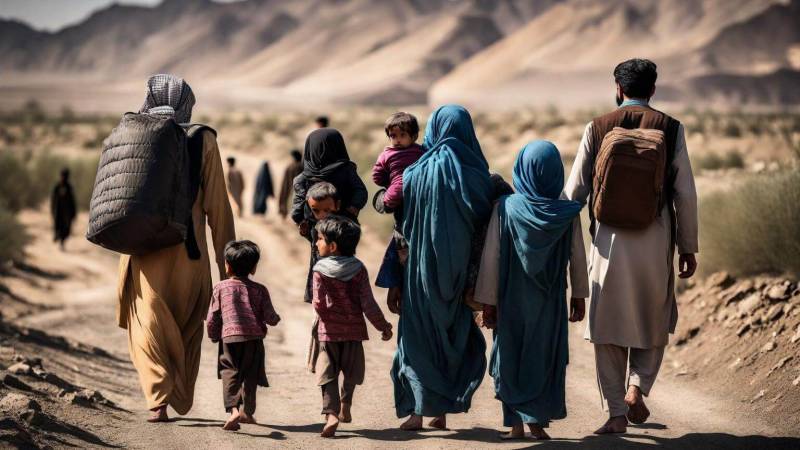
A sea of Afghans, men, women, children, with infants cradled by their parents and laden with their life's belongings on their backs, in hand carts or on trucks packed higher than their guardrails, inched across the border at Torkham and Chaman on Tuesday, the last day for illegal migrants to voluntarily return to their home countries.
On the other side, Afghans stepped into a world of uncertainty with little to no support for what appears to be a long winter of despair.
Pakistan had set a deadline, which expires at midnight on November 1. After that, any undocumented or illegal migrants, from any nationality found by the authorities in Pakistan would be legally prosecuted and deported. Afghans, who make up around 1.7 million migrants, are the most affected by this move.
"Over 84,000 families have so far been registered repatriating to Afghanistan from Torkham border alone," a security officer at the Torkham border in Khyber Pakhtunkhwa (KP) confided to The Friday Times. The total from the Chaman border in Balochistan put the total at over 100,000.
Shahid Hussain of the Sarhad Chamber of Commerce and Industry (SCCI) told The Friday Times that many families have returned to Afghanistan this month from the two border crossings. But it had failed to stop long queues of people waiting to enter and get registered in Afghanistan from forming at each border crossing.
On the Afghan side, the Interim Afghan Government have set up registration points to process each family. Officials on the Afghan side said that until last week, around 3,000 individuals were crossing over daily. But the numbers have increased exponentially since then, swamping government and non-governmental registration camps.
Every Afghan who crossed back into Afghanistan with their life belongings dragged by a tether had a great sense of uncertainty, fear and anger about their future. Many who had fled Afghanistan after the Taliban takeover from the US in August 2021, had fled the very regime they will now be forced to live under.
Others, however, had spent the majority of their life in Pakistan and had had little demonstrable connection with their ancestral towns and villages in Afghanistan.
But before that, they would have to find some semblance of life. Some returning Afghans have relatives or even their homes in Afghanistan where they can put down roots. But others had moved when they had already lost everything and had nothing to return to. The interim Afghan government, led by the Taliban, though, has made little preparation other than to allocate a place for the repatriating refugees to camp.
"The government has made arrangements for families, and more efforts in this regard are underway," Interim Afghan Government Refugee Ministry Spokesperson Abdul Mutaleb Haqqani told The Friday Times earlier in the week as the influx of repatriating nationals intensified.
Thousands of Afghan refugees who have returned to Afghanistan in recent weeks do not possess any documents to legally stay in Pakistan. And there are still thousands more like them scattered across Pakistan.
Advise for pause
Islamabad has chalked out a multi-phase plan to repatriate illegal and even legal refugees, citing security concerns. The government plans to launch a crackdown against illegal migrants from November 1.
However, human rights agencies, foreign non-governmental organisations (NGOs) and religio-political parties on both sides of the border have urged Islamabad to reconsider their ‘hard stance’.
When contacted, a representative for the United Nations High Commissioner for Refugees (UNHCR) said that together with their humanitarian partners, they have appealed to Pakistani authorities to continue protecting all vulnerable Afghans who have sought refuge in the country and could be at imminent risk if they are forced to return.
"Afghanistan is going through a severe humanitarian crisis with several human rights challenges - particularly for women and girls, and a series of natural disasters," Afridi said, adding that such plans would have serious implications for all who have been forced to leave the country and may face serious protection risks upon return.
"We appreciate the generous hospitality of countries towards Afghan nationals for over four decades, despite challenges, and repeat the call for all returns to be voluntary, safe and dignified — without any pressure, to ensure protection for those seeking safety," the official said.
To a question about the exact figure of registered Afghan refugees, he said that some 1.3 million Afghan refugees are living legally in Pakistan and have been issued the "Proof of Registration" (PoR) cards. Of these, 840,000 hold Afghan Citizens Cards (ACC). Moreover, some 600,000 Afghan refugees are believed to have crossed into Pakistan since August 2021.
According to the government, he said, there were some 600,000 to 700,000 other undocumented Afghans in Pakistan before 2021.

